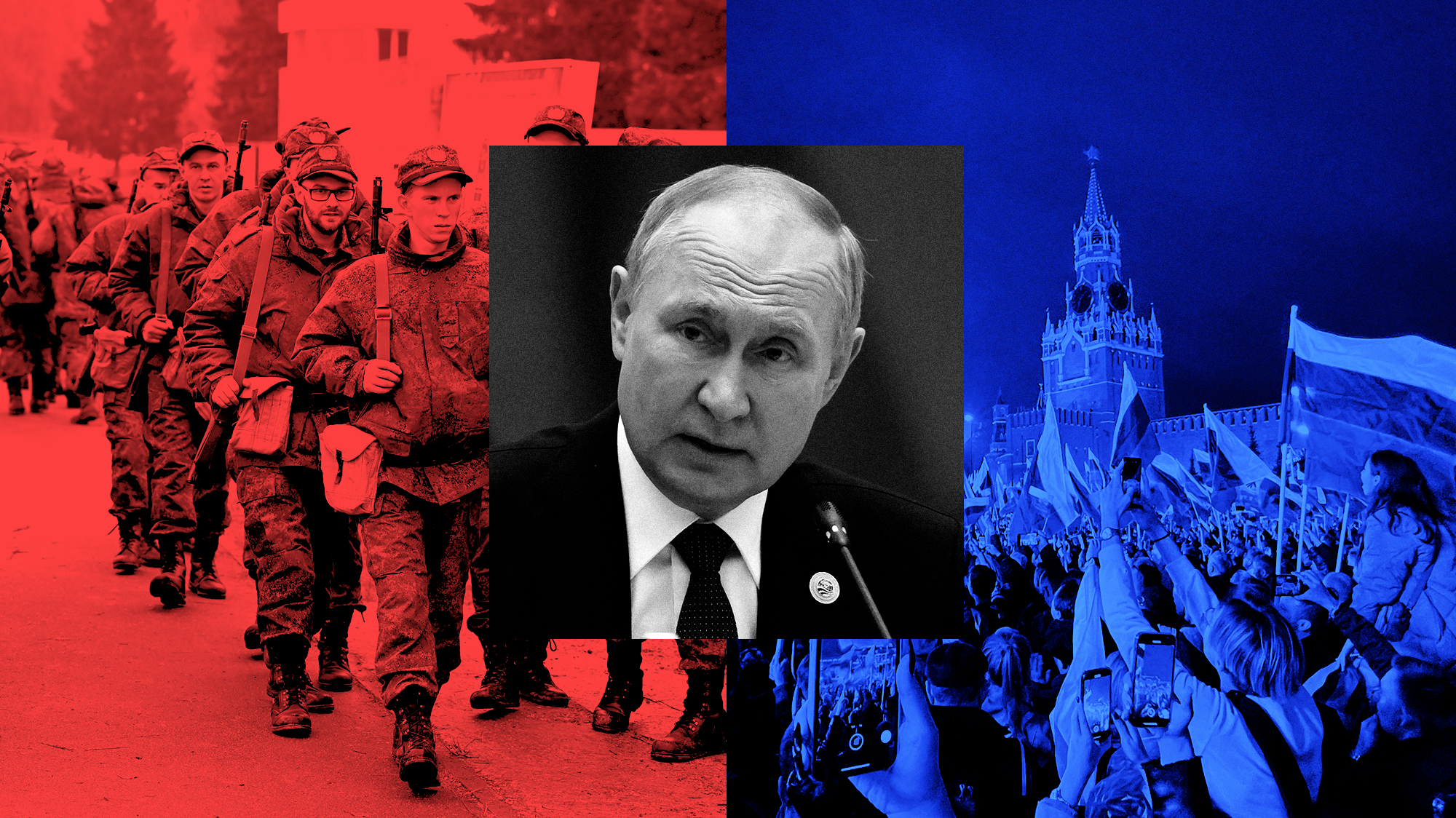Editor’s note: This essay is anonymous in order to protect the writer from potential reprisals.
Russia is not at war, despite what you may have heard. Despite the mobilization of reservists, the stories and images of destruction and death, despite the refugees fleeing. Russia is not at war, as Dmitry Peskov, press secretary of the Kremlin stressed in a recent interview. Instead, it is conducting a special military operation “to fulfill certain goals in Ukraine.” Reservists have had to be mobilized for this special military operation, half a year since it began, because “we have been de facto confronted…with the NATO block and all its logistics capabilities.”
Referring to the Special Military Operation as war is still illegal in Russia, punishable by up to 15 years in prison. It also happens to be illegal to cross into the territory of a neighboring sovereign nation, armed, without a declaration of war. But while people do call the special military operation a war in casual conversations, they rarely question this operation’s legality: not even as men receive their mobilization notices, board buses, and head to the front.
But perhaps those who were mobilized will never cross international borders. By the time they reach the occupied territories, those territories will no longer be foreign—at least in the eyes of Russian law. For there is not only a mobilization drive at hand but also a referendum. People in the occupied territories have been asked to vote on whether to join Russia. Armed soldiers have gone door-to-door with ballot boxes. And on September 30, 2022, Putin welcomed the annexation of four Ukrainian regions as the “will of millions of people.”
Voting makes annexation look democratic.
Meanwhile, in Russia, mobilization has hit closer to home. And it comes with little ideological backing. In St. Petersburg, local newspaper headlines focus on pressing everyday questions: Who will be mobilized? Will the Finnish border close? What will the city budget look like in 2023? Or else they touch on polite distractions: news of the occasional train accident, or tips about how to lose weight. None of it would excite someone to go kill and die on the front lines.
The military draft is a two-step process. First, you are handed a draft notice and asked to sign acknowledging having received it. This is the first opportunity for people to dodge. If the draft officers can’t find you, they can’t give you the notice. But the receipt of the notice is only a summons to appear, and this opens a second gap within which people try to maneuver. This stage is more dangerous—any traffic stop, any random search in the metro, and you’ll come up in their system, be taken to the conscription office, and sent off to war.
Draft notices may be distributed at work, through state enterprises and private businesses. And these same organizations may also compile exemption lists of the employees they cannot do without. Water cooler talk this week has focused on how to get the most vulnerable on these lists, on how to get them out of the country, or how to avoid receiving the dreaded notice in the first place.
There has been rioting in Dagestan, but here in St. Petersburg people are focused on fleeing and dodging. Women are afraid for their husbands, their sons, and their fathers. Our highest priority aboard this Titanic is not women and children, but men—getting them out of the country, on the lifeboats to Kazakhstan.
Faced with the draft, even former war hawks are turning. A retired cop from a mid-sized Siberian town, a friend’s dad, used to support this undeclared war. He watched Vladimir Solovyov, the ecstatic Goebbels of Russian State Propaganda, and repeated everything that he heard. When his Ukrainian friends called him to say that they were being bombed, he refused to believe them. And then the draft officers got him. “They got him outside, in the yard,” my friend tells me, in tears. “Mother told him not to go out there, but he didn’t listen, they gave him the notice …” She’s already contacted a lawyer. “Doesn’t he want to go?” I ask her. “Of course, he doesn’t want to go!” she says, crying. “But he’s a hunter. He’ll go live in the woods. He’s got a gun.” And, perhaps, Solovyov will be there with him on the portable television.
But other people are going. They are going even though the formal reasons given to justify this undeclared war are too abstract and nonsensical to mobilize anybody to fight.
At the celebratory annexation of Ukrainian territories, president Putin explained that Russia was standing up to colonial western aggression. He blamed the mysterious blasts that damaged the Nord Stream pipeline on “Anglo Saxon” sabotage. He insisted that Russia was fighting Satanism. Such vague conspiratorial statements have justified the “special military operation” since its inception. “We have no borders with Ukraine,” Vladimir Zolotov, Head of the National Guard, told the Security Council on the eve of the invasion. “Our border is with the Americans because they are the owners in that country. Everyone else there is their vassal.”
These sentiments are not uncommon: that NATO had planned to attack us, that the good people of Ukraine are held hostage by some inchoate Naziism, that Ukraine is and has always actually been part of Russia. But as reasons for war, they are abstract. They are not ideas for which people willingly go off to die.
Then why do they go? They go “for their own,” for those whom they cannot abandon.
When the draft was announced, mobilized men were promised 300,000 rubles (about $5,000) upon assignment, and their families were promised another seven million rubles (about $120,000) should they get killed. A week later, this legislation was quietly recalled. But a federal law granting the mobilized a moratorium on loan payments did pass the State Duma, and some regional governments implemented their own welfare programs. In Tuva, a remote republic in Siberia, the regional government promises families of mobilized men one live sheep, 50 kg of flour, a bag of potatoes, coal, and “in cases of demonstrated need” an unspecified amount of cabbage. For every child under the age of seventeen, a family receives another 5,000 rubles ($86). “It is important that mobilized men see their families receive this assistance before their deployment,” explained Vladislav Khovalyg, head of the Republic of Tuva, “so that they feel supported and leave with the feeling that their families are protected and will not be left without attention.”
The flip side of such benevolent policies is that families of the mobilized are expected to get them ready for the front. Soldiers are told to get their own gear: boots, backpack, socks, sleeping bag, headlamp, first aid kits—if possible, a good bulletproof vest. Online discussion boards are lively with panicked relatives asking where to buy the first-aid medicines that have sold out in local stores. Videos circulate online in which mobilized men are lined up in the barracks and told, “take care of yourselves, guys, because no one else is going to.” Among other things, they are told, “now don’t laugh—ask your wives and girlfriends to send you tampons, menstrual pads.” The tampons are for dressing wounds, in the absence of blood-stopping bandages.
In Russia, we do not abandon our own. This is the slogan under which this undeclared war is being conducted. And it rings true. “Well, the guys are all grudgingly for it,” say wives worried about their men being mobilized, “they have a men’s cult, you know, a battle brotherhood. They say, ‘Yeah we get it, but our guys have already been there three months with no end in sight. Gotta help the guys. Give them a breather’.”
Decades of WWII fetishism have a lot to do with this. As does a deeper collectivist social structure that makes it very easy to form social networks woven through the existing hierarchical strata, but nearly impossible to create social organizations that would directly oppose regulations and rules. Russia works by informal personal networks. People rely on them to get by in the face of dire poverty, and they use them to do good in the world: to help Ukrainian refugees flee to the EU through Russia, to send humanitarian aid to the occupied territories, to “support our guys” on the frontlines and in military hospitals. These informal networks unite people of different social statuses, income levels, and personal views. But they foreclose public discussions of “politics.” Improper political statements threaten to fry the whole network. They threaten to draw unneeded attention to informal ties in a way that puts everybody in danger. So the question of why we have invaded Ukraine—why we killed, destroyed, maimed, and occupied—this question is one that most people simply don’t openly pose.
On October 7, 2022, Vladimir Putin turns 70. His birthday isn’t widely anticipated—no billboards, no fanfare. It hangs in the air like a nervous rumor. What if he’d like some nuclear fireworks to mark his Big Day?
But even as people are wary of the draft and fearful of nuclear Armageddon, they do not organize political protests to end this “special military operation” and bring down the government that wields it. And not only because they fear the police. People in Russia do protest when they feel it is necessary. They protest corrupt local governance, or landfills being dug in their backyards. Sometimes these public actions turn violent, like the anti-mobilization protests in Dagestan have. But this undeclared war is not something that most people in Russia think to protest. The idea simply does not occur.
Is there hope? Perhaps it is with the enduring dignity of these mobilized middle-aged men, their friends, and their families. The internet is full of videos of them boarding the buses, piss drunk, getting into fistfights, asking who’s going to feed their wives and children once they get killed. On September 30, while members of Putin’s High Society celebrated the annexation of Ukrainian territories, a bus full of mobilized men flipped in Tatarstan. According to eyewitness accounts, one of the men threw himself on the steering wheel, drunk. Perhaps Putin’s poorly oiled military machine will choke on these fine everyday guys and finally sputter dead.











